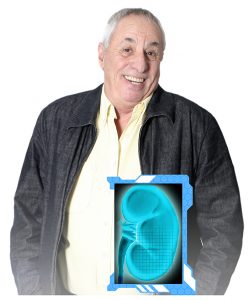Journey through Health: Kidneys
Age-Related Kidney Changes
The kidneys have many important roles.  They remove wastes and excess water, control blood volume and blood pressure, regulate
blood nutrient levels, convert vitamin D into the active form, and maintain acid-base
balance. Some of these kidney functions tend to decline with age.
They remove wastes and excess water, control blood volume and blood pressure, regulate
blood nutrient levels, convert vitamin D into the active form, and maintain acid-base
balance. Some of these kidney functions tend to decline with age.
Diet, Physical Activity, and Kidney Health
Fluid Loss and Dehydration.
With age the kidneys are less able to conserve water resulting in increased fluid loss. This can increase the risk of dehydration. This is a problem because other factors also place older adults at risk of dehydration. For example, total body water decreases with age, resulting in a smaller margin of safety against water loss. In addition, the thirst sensation decreases with age and as a result many older adults do not consume enough fluids. Additionally, many older adults use medications which can increase fluid loss. Furthermore, incontinence is a common problem with age which may result in self-limiting fluid intake.
Dehydration can result in weakness, dry mouth, decreased urine volume, constipation,
nausea and vomiting, headache, irritability, sleepiness, increased temperature, increased
heart rate, decreased blood pressure, dizziness, confusion and even death. Dehydration
can also increase the risk of kidney stones, urinary tract infections and pneumonia.
Recommended fluid intake is 13 cups of fluid a day for males and 9 cups a day for females. Additional fluid is needed to replace losses due to illness and extreme heat or humidity. Although caffeinated beverages result in more fluid loss than water, caffeinated beverages can be counted towards fluid intake. However, alcohol results in extreme fluid loss and should not be counted towards fluid intake.
Conversion of Vitamin D to Active Form.
With age, the kidneys are less able to convert vitamin D into the active form. In addition, the ability of the skin to synthesize vitamin D also decreases with age. As a result, the recommended dietary intake for vitamin D increases with age.
Kidney Disease.
Kidney disease (acute, chronic, and end stage kidney failure) tends to increase with age. However, kidney disease is usually due to other health problems such as high blood pressure, atherosclerosis, and diabetes. Preventing or controlling blood pressure, atherosclerosis and diabetes can help lower the risk of kidney disease. There are many actions which can lower the risk of high blood pressure, atherosclerosis, and diabetes.
- Prevent high blood pressure or keep blood pressure under control.
- Prevent diabetes or keep diabetes under control.
- Maintain a healthy weight.
- Be physically active each day.
- Abstain from smoking.
- Choose foods with less saturated fat and trans fat. When consuming fats choose more unsaturated fats and oils.
- Choose foods with less added sugar.
- Choose and prepare foods with less added salt and sodium.
- Use alcohol in moderation.
- Consume ample fruits, vegetables, whole grains, legumes, seafood, and low-fat milk.
MyPlate Messages Promoting Kidney Health
Several of the MyPlate Messages can help promote kidney health.
Build a Healthy Plate
- Make half your plate fruits and vegetables.
- Switch to skim or 1% milk.
- Make at least half your grains whole.
- Vary your protein choices.
- Drink six to eight cups of fluid each day.
Cut Back on Foods High in Solid Fats, Added Sugars, and Salt
- Choose foods and drinks with little or no added sugars.
- Look out for salt in foods you buy.
- Eat fewer foods that are high in solid fats.
- Make major sources of saturated fats occasional choices, not everyday foods.
- Select lean cuts of meats or poultry and fat-free or low-fat milk, yogurt, and cheese.
- Switch from solid fats to oils when preparing food.
Eat the Right Amount of Calories for You
- Enjoy your food, but eat less.
- Cook more often at home, where you are in control of what is in your food.
- When eating out, choose lower calorie menu options.
- If you drink alcoholic beverages, do so sensibly.
Be Physically Active Your Way
- At least 150 to 300 minutes of moderate-intensity physical activity a week, or 75
to 150 minutes of vigorous-intensity physical activity, or an equivalent combination
of moderate and vigorous-intensity physical activity.
- If you cannot meet this guideline, be as physical active as your abilities and conditions will allow.
Sources
Bernstein M, Luggen A.S. Nutrition for the Older Adult. Sudbury, MA: Jones and Bartlett publishers; 2010.
Brown JE. Nutrition in Older Adults. In: Nutrition Through the Life Cycle 4th ed. Belmont, CA: Wadsworth, Cengage Learning; 2011.
Chernoff R. Geriatric Nutrition, 3rd ed. Sudbury, MA: Jones and Bartlett publishers; 2006.
National Institute on Aging. AgePage: Kidney Disease: A Silent Problem.
Rolfes SR, Pinna K, Whitney E. Understanding Normal and Clinical Nutrition, 7th ed. Thomson/Wadsworth Publishing Co., Belmont, CA., 2008.
United States Department of Agriculture. ChooseMyPlate.gov. Accessed at ww.choosemyplate.gov
United States Department of Health and Human Services. 2018. Physical Activity Guidelines For Americans. 2nd ed.
Janice Hermann
Extension Nutrition Specialist
Seung Eun Jung
Graduate Student and Research Assistant
